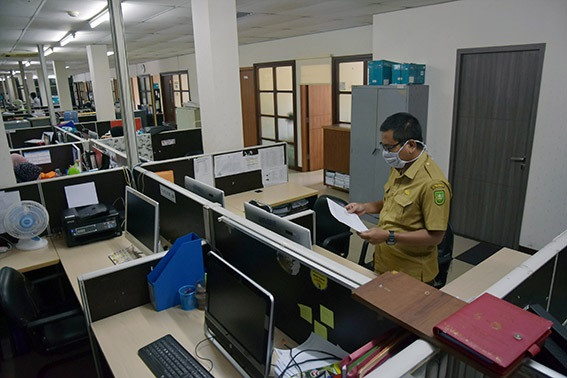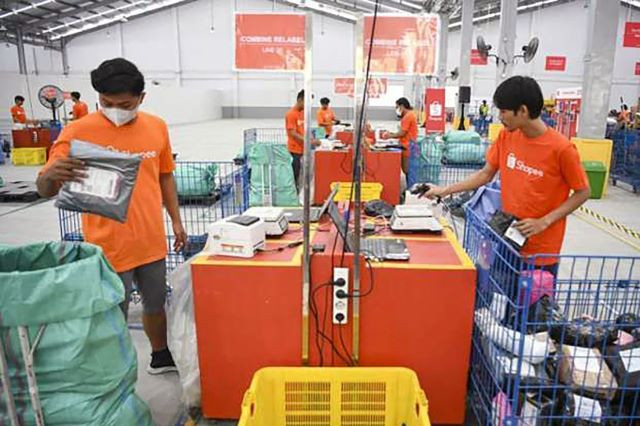Popular Reads
Top Results
Can't find what you're looking for?
View all search resultsPopular Reads
Top Results
Can't find what you're looking for?
View all search resultsWet, dry and something in between
To the newcomer, Jakarta's toilets can be something of curiosity
Change text size
Gift Premium Articles
to Anyone

T
o the newcomer, Jakarta's toilets can be something of curiosity.
"At first I wondered what those things were," Steven Paul, a Canadian who recently came to Jakarta to teach English, says of the spray hoses often attached to public toilets in the city.
"They're like something that should be beside your kitchen sink."
The spray hoses, as most Jakartans know, are for washing one's private parts.
But people not familiar with the concept of using water for anything in a toilet besides flushing might consider the idea bizarre at first.
"Most of the toilets in Canada, and in Beijing, where I taught before, only had toilet paper," Paul says.
He has learned to become friendly with the hoses over time, though.
"Eventually I figured out the use, and I found the accommodation of the sprayer and toilet paper to be quite nice," he laughs.
His words described precisely the wet-dry concept of Jakarta's toilets. The use of water inevitably calls for tissue, but first one must come to grips with the cultural significance of the water itself.
"I was taught from a young age to cleanse myself with water," says secretary Ratna Dewi.
"It's just common sense for me. The idea of using only tissue is icky."
Most Indonesians are taught similarly. Toilet paper for the toiler is a fairly recent concept.
"Culturally, Indonesians find it hard to just use toilet paper alone," says Naning S. Adiningsih Adiwoso, chairwoman and founder of the Indonesian Toilet Association.
Spray hoses are not the most hygienic options, however.
"We don't know where the sprayers have been, so it's quite risky to use them, because of all the diseases you might catch," Naning says.
A safer option would be the built-in water jets that turn the toilet bowl into a bidet, which offer less direct contact with the skin, she says.
Ratna says she prefers water jets: "It's less messy and easier to use."
Bidet or spray hose, you still need toilet paper to dry yourself, and that becomes an issue all its own.
"I find *Jakarta* isn't much different from Beijing. The toilets clog too easily. It probably has something to do with the pipe width," Paul says of the habit of flushing used tissues.
Naning says the type of toilet paper involved plays a large part in the clogging problem.
"The toilets won't clog if the toilet paper is easily dissolved or biodegradable," she says, "But that kind of toilet paper is expensive, so not many public places will use it."
Teges P. Soraya Guerinoni, the senior marketing and communications manager of the Grand Indonesia shopping mall, advised against visitors flushing used toilet paper.
"It might cause clogging. If biodegradable paper was easily available and affordable, we'd use it, but it isn't," Teges told The Jakarta Post.
Some malls say flushing toilet paper does no harm to their pipes.
"We suggest that customers flush their toilet paper for hygienic reasons," says Anastasia Damastuti, spokeswoman for Mall Taman Anggrek in West Jakarta.
"We use environmentally friendly paper, so there's no need to worry about the paper clogging the pipes."
Trisula Hariana, from Plaza Indonesia, also says flushing toilet paper is acceptable because the mall uses the right kind of paper.
Nevertheless, almost all of the malls in Jakarta provide disposal bins in each stall, as if to discourage the flushing of toilet paper.
Law student Dina Denso says the bins often make her trips to the toilet unpleasant: "The bins don't even have a lid, so I can see what's on the discarded tissue; it's disgusting."
A proud scrutinizer of hygienic matters, Dina has much to say about the state of Jakarta's toilets.
"I wish they'd provide toilet seat sanitizers because I don't want to catch any diseases from sitting on toilets," she says.
"I actually prefer squat toilets."
Dina is perhaps among the few who disagrees with the wet-dry system, and says it would be better to skip the wet part.
"Not only is *the use of sprays or water jets* less hygienic, it's also messy and hazardous," she says.
"I mean, what if someone leaves puddles of water inside the stall? An elderly person might slip and fall."
On the whole, she says, she still has much apprehension.









